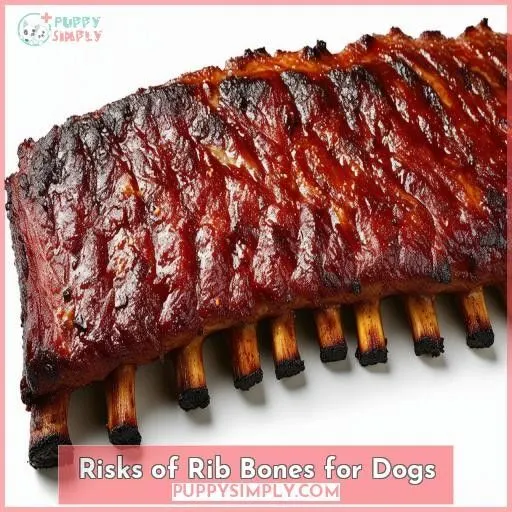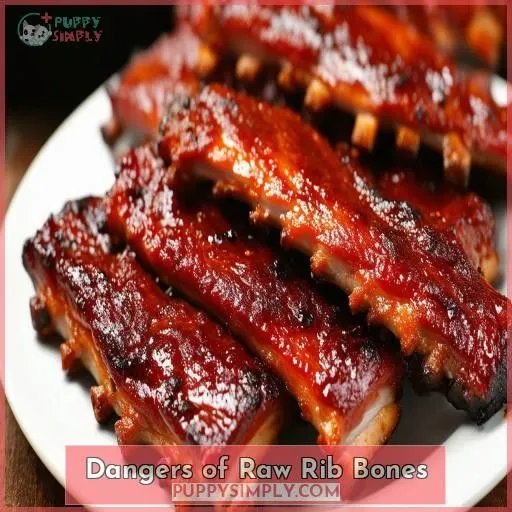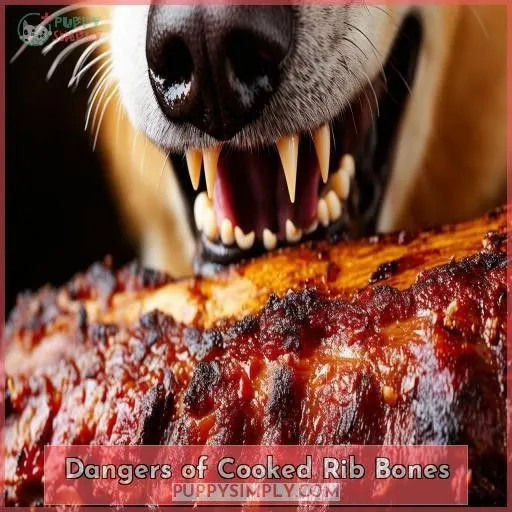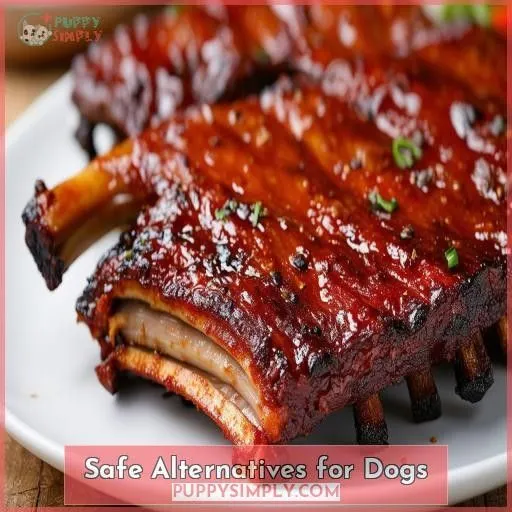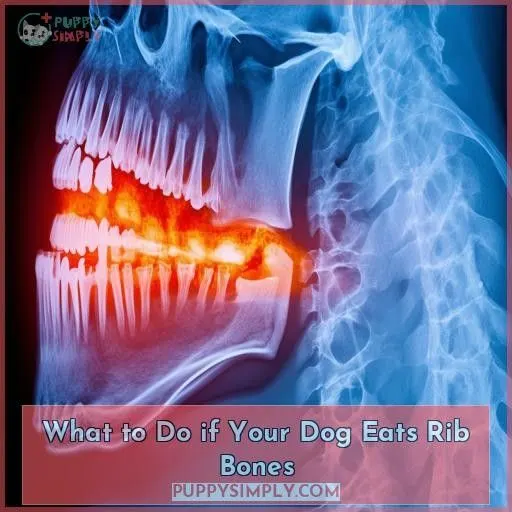This site is supported by our readers. We may earn a commission, at no cost to you, if you purchase through links.
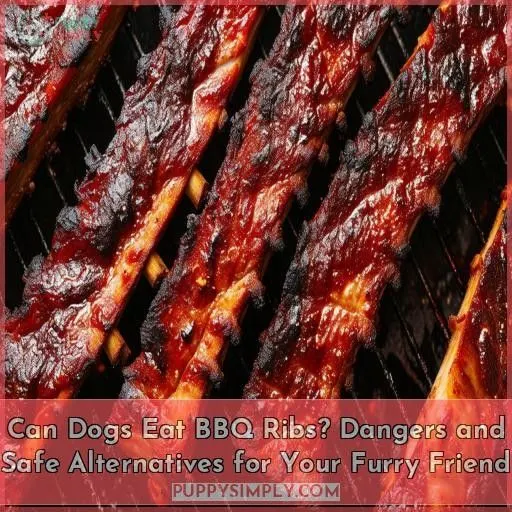 While the smell of BBQ ribs might make your pup drool, it’s best to avoid sharing this tasty treat.
While the smell of BBQ ribs might make your pup drool, it’s best to avoid sharing this tasty treat.
Cooked rib bones can splinter, causing serious internal injuries or obstructions if swallowed. Raw rib bones also carry risks like bacterial contamination and choking hazards.
Rather than putting your furry friend in harm’s way, opt for safer chew alternatives like durable toys or dental chews designed specifically for dogs.
If your pup does manage to snatch a rib bone, monitor closely for concerning symptoms – what happens next could have you rushing to the vet.
Table Of Contents
- Key Takeaways
- Can Dogs Eat Bbq Ribs?
- Risks of Rib Bones for Dogs
- Dangers of Raw Rib Bones
- Dangers of Cooked Rib Bones
- Safe Alternatives for Dogs
- What to Do if Your Dog Eats Rib Bones
- Frequently Asked Questions (FAQs)
- Can dogs eat barbecue rib meat?
- What if my dog ate BBQ rib bones?
- Can dogs eat BBQ pork?
- What to do if a dog eats pork bone?
- How much of a rib bone is dangerous?
- How long after eating bones can complications arise?
- Are rib bones worse than other types of bones?
- Can puppies digest rib bones more easily than adults?
- Conclusion
Key Takeaways
- Rib bones are like landmines for your pup’s digestive tract – they can splinter and wreak havoc from the inside, causing obstructions, perforations, and even internal bleeding. Yikes!
- While that savory BBQ scent is oh-so-tempting, resist the urge to share those ribs. The bones aren’t worth the risk of an emergency vet visit or a painful case of pancreatitis for your furry friend.
- If your sneaky pup manages to nab a rib bone, be on high alert. Watch them like a hawk for signs of distress – vomiting, diarrhea, lethargy – anything out of the ordinary could signal a bone-related crisis brewing.
- Instead of gambling with rib bones, treat your pup to safer chew toys and dental treats designed for their chomping pleasure. Their tail will still wag, and you’ll sleep better knowing they’re not one rib bone away from disaster.
Can Dogs Eat Bbq Ribs?
No, dogs shouldn’t eat BBQ ribs. The bones can splinter and cause blockages or punctures in the digestive tract, potentially leading to serious health issues.
Risks of Rib Bones for Dogs
You might be tempted to share those tasty BBQ ribs with your furry friend, but rib bones pose serious risks to dogs.
Bone splintering and intestinal perforation are real threats – those sharp edges can do major damage as they work their way through your pup’s digestive system.
And that’s not all – bone fragments can also cause bacterial contamination, leading to nasty gastrointestinal distress or even pancreatitis.
Cooked bones are especially dangerous since they’re more likely to splinter, while raw bones can harbor harmful bacteria.
Either way, those bones could become serious foreign body obstructions or cause mouth damage if your dog gnaws too aggressively.
It’s best to steer clear and choose safer chew alternatives for Fido.
Dangers of Raw Rib Bones
Raw rib bones pose a significant risk to your dog’s health due to potential bacterial contamination, which can lead to foodborne illnesses. They also present a choking hazard and can cause intestinal blockages if swallowed, necessitating immediate veterinary attention.
Bacterial Contamination
When feeding raw rib bones, you risk transmitting dangerous pathogens to your pup. Bacteria like salmonella or the parasite Trichinella spiralis from undercooked pork can cause severe food poisoning, leading to vomiting, diarrhea, and loss of appetite. Always cook barbecue rubs thoroughly to mitigate these health risks.
Intestinal Blockages
Ingesting raw rib bones poses serious digestive risks. Sharp fragments can puncture or obstruct your dog’s gastrointestinal tract, leading to intestinal inflammation, gastrointestinal bleeding, and potentially life-threatening complications requiring emergency veterinary care or surgery.
Choking Hazards
Choking hazards are severe risks when dogs consume raw rib bones. Avoid leaving your pup unattended while chewing bones. Watch for these signs:
- Excessive drooling or coughing
- Pawing at the mouth
- Gagging or retching
- Difficulty breathing
If these occur, it’s a veterinary emergency – time is essential.
Dangers of Cooked Rib Bones
Cooked rib bones pose serious risks to dogs due to their tendency to splinter and create sharp fragments that can puncture the digestive tract. The high fat content in ribs can also trigger pancreatitis, a potentially life-threatening condition characterized by gastrointestinal distress like vomiting and diarrhea.
Splintering and Perforation
Cooked rib bones are more susceptible to splintering, resulting in sharp fragments that can seriously injure your dog. These bone shards risk perforating the intestinal lining, leading to internal bleeding and requiring emergency surgery. Avoid cooked pork rib bones entirely to prevent intestinal damage and vomiting from bone splinters.
Pancreatitis Risk
BBQ ribs pose a pancreatitis risk for dogs, as cooked bones can splinter, causing:
- Damage to the pancreas
- Inflammation
- Digestive enzyme release
Pancreatitis symptoms include vomiting, diarrhea, and abdominal pain. Monitoring and prompt vet care are essential if pancreatitis is suspected.
Gastrointestinal Distress
Plus, the fatty tissue and seasonings on cooked ribs can also lead to vomiting, diarrhea, and severe dehydration if your furry friend ingests them. To avoid gastrointestinal distress and potential pancreatitis, it’s best to steer clear of offering your dog those tempting barbecue ribs.
Safe Alternatives for Dogs
While rib bones pose significant risks to dogs, providing safe and durable chew toys, dental chews, and frozen treats stuffed in puzzle feeders can satisfy their natural urge to chew while promoting dental health and mental stimulation. Supervision remains essential when offering any chew item to prevent potential obstructions or ingestion hazards.
Durable Chew Toys
Durable chew toys offer a safe alternative to rib bones. Look for tough rubber toys that won’t splinter, preventing mouth and tongue injuries. These toys also promote dental health by cleaning your pup’s teeth as they chew. Supervise closely, as even durable chew toys can pose choking hazards when worn down.
Dental Chews
You can safeguard your pup’s oral hygiene with dental chews designed to scrape away tartar buildup and promote gum health. These bone-shaped treats are safer alternatives to rib bones, providing dental benefits without risking throat damage or intestinal perforations.
Frozen Treats
You can create frozen treats by stuffing a durable chew toy with tasty goodies like low-fat yogurt or peanut butter. These treats benefit your dog’s dental health while preventing boredom and providing a safe, teeth-cleaning outlet.
What to Do if Your Dog Eats Rib Bones
If your dog has eaten rib bones, it’s essential to monitor them closely for signs of discomfort or distress, such as vomiting, diarrhea, lethargy, or loss of appetite. Seeking prompt veterinary attention, especially if symptoms arise, is highly recommended to address any potential complications and prevent further harm.
Monitoring for Symptoms
If your pup ingests rib bones, watch for these signs:
- Vomiting
- Diarrhea or constipation
- Lethargy or abdominal pain
Prevention is best, but close monitoring is imperative. Contact your vet if symptoms arise, as prompt treatment could be life-saving.
Seeking Veterinary Care
If your dog ingests rib bones, it’s essential to seek prompt veterinary advice, especially if alarming symptoms arise – vomiting, lethargy, or bloody stools. Outline concerning details for the vet; they’ll guide next steps to avoid potentially life-threatening complications from bone fragments.
Prevention Strategies
To prevent future incidents, securely dispose of rib bones, provide safe chewing alternatives, and supervise your pup during meal times. Maintain their dental hygiene with approved treats, and guarantee a nutritionally balanced diet for overall well-being.
Frequently Asked Questions (FAQs)
Can dogs eat barbecue rib meat?
Imagine your dog gulping down a rib bone – it could splinter and perforate their intestines. While dogs can eat some cooked rib meat, the bones pose serious choking and obstruction hazards. It’s best to steer clear and offer safer chew alternatives.
What if my dog ate BBQ rib bones?
If your dog ate BBQ rib bones, seek veterinary care immediately. Cooked bones splinter easily and can puncture their digestive tract, leading to severe consequences like internal bleeding or obstructions. Don’t wait for symptoms – this is an emergency situation.
Can dogs eat BBQ pork?
As tempting as it may be, you should never feed your dog BBQ pork. The intense spices, sauces, and seasonings can severely upset their stomach and potentially lead to pancreatitis – a life-threatening condition.
What to do if a dog eats pork bone?
If your dog eats pork bones, don’t panic. Monitor them closely for signs of distress like vomiting, lethargy, or constipation. Call your vet immediately if any concerning symptoms arise, as the bones could splinter and cause internal injuries.
How much of a rib bone is dangerous?
Even a small rib bone fragment can cause serious internal injuries in dogs. It’s best to avoid giving dogs cooked bones entirely to prevent life-threatening complications like obstructions and perforations.
How long after eating bones can complications arise?
You should watch your dog closely for signs of intestinal obstruction or discomfort up to 72 hours after ingesting bones. Complications can arise suddenly, so act quickly if your dog shows symptoms.
Are rib bones worse than other types of bones?
Absolutely, rib bones pose more risks than other bones due to their narrow, cylindrical shape. They’re likelier to splinter when chewed, creating jagged fragments that can puncture organs, block intestines, and cause life-threatening complications. Avoid them for your pup’s safety.
Can puppies digest rib bones more easily than adults?
No, puppies can’t digest rib bones more easily. Their small jaws and delicate digestive systems put them at higher risk for intestinal injuries or obstructions from bone fragments. It’s best to avoid giving any bones to puppies.
Conclusion
Ultimately, can dogs eat BBQ ribs? No, the risks far outweigh any potential benefit.
While tempting, denying your pup those savory bones is wise. Invest in safer chew alternatives designed specifically for dogs’ dental health and digestive needs.
Closely monitor symptoms after accidental ingestion and promptly seek veterinary care. This is crucial to avoid potentially life-threatening complications.
Protect your furry friend by avoiding rib bones altogether.

